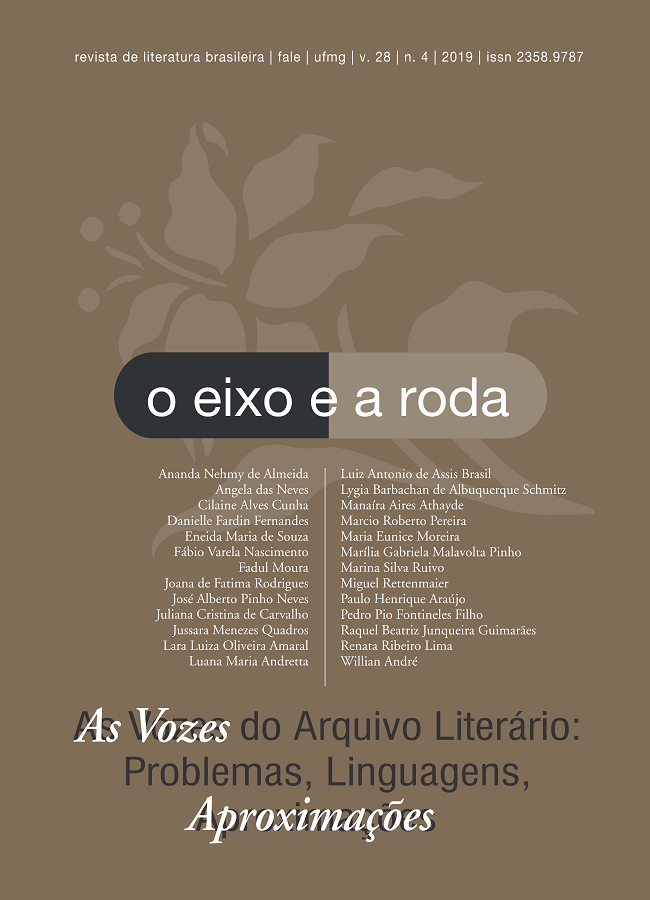O riso unido ao distanciamento
correlações com o conto “Jacinto”, de Alphonsus de Guimaraens, Cândido, ou o otimismo, de Voltaire e nuanças de um Alphonsus humorista em arquivos históricos / The Laughter Coupled with Distancing: Interconnections with the Short Story “Jacinto” by Alphonsus de Guimaraens, the Candide: or Optimism by Voltaire and Nuances of an Alphonsus Humorist in Archives
DOI:
https://doi.org/10.17851/2358-9787.28.4.291-314Palabras clave:
Alphonsus Guimaraens, museu, Voltaire, riso, Jacinto (recordações de Vila Rica, Cândido: ou o otimismoResumen
Resumo: Este artigo trata do riso unido ao distanciamento, correlações com o conto “Jacinto (recordações de Vila Rica)”, de Alphonsus de Guimaraens e o livro Cândido, ou o otimismo, de Voltaire, e também busca traçar um perfil humorista do poeta com base nos arquivos do Museu Casa Alphonsus Guimaraens. Ambos os autores, embora vivessem em países e épocas diferentes, de certo modo, acabaram se aproximando em suas escritas. Um, filósofo, dramaturgo e historiador, outro, poeta simbolista, se renderam aos artifícios da comicidade e produziram trabalhos que pertencem ao campo humorístico. No caso de Alphonsus, autor destacado neste trabalho, há uma personalidade que necessita ser delineada nesse sentido, uma vez que há uma grande quantidade de criações relacionadas ao riso nos manuscritos e outros documentos do Museu Casa Alphonsus Guimaraens, e todos, normalmente o conheciam como um poeta taciturno, o “solitário de Mariana”. No geral este estudo busca investigar como Voltaire, em Cândido, ou o otimismo, e Alphonsus no conto “Jacinto (recordações de Vila Rica)”, usam a ironia para provocar o riso, algo que, numa avaliação mais profunda, traduz uma decepção com o social e com a realidade existencial, gerando uma espécie de distanciamento. Pretende, por fim, com base em pesquisas em documentos históricos, encontrar uma lembrança dessa outra faceta de Alphonsus. O livro O riso e o risível: na história do pensamento, de Verena Alberti e o capítulo “Rabelais e a história do riso” em Cultura popular na idade média e no renascimento, de Mikhail Bakhtin, completam a investigação.
Palavras-chave: Alphonsus Guimaraens; museu; Voltaire; riso; Jacinto (recordações de Vila Rica; Cândido, ou o otimismo.
Referencias
ALBERTI, Verena. O riso e o risível: na história do pensamento. Rio de Janeiro: Jorge Zahar Ed, 1999. (Coleção Antropologia Social).
ANDRADE, Carlos Drummond de. João Ventania: um dos lados de Alphonsus de Guimaraens. Leitura: a revista dos melhores escritores, Rio de Janeiro, ano 16, n. 7, p. 23-24, jan. 1958.
BAKHTIN, Mikhail. Cultura popular na Idade Média e no Renascimento: o contexto de François Rabelais. Tradução de Yara Frateschi Vieira. São Paulo: HUCITEC; Brasília: Editora da Universidade de Brasília, 1987.
BATAILLE, Georges. A experiência interior. Tradução de Celso L. Coutinho et al. São Paulo: Ática, 1992.
BERGSON, Henri. O Riso: ensaio sobre a significação da comicidade. Tradução de Ivone Castilho Benedetti. São Paulo: Martins Fontes, 2001. (Coleção Tópicos)
DUARTE, Lélia Parreira. “Missa do galo”: ironia romântica, humor e leveza. In: ______. Ironia e humor na literatura. Belo Horizonte: Editora PUC Minas; São Paulo: Alameda, 2006.
FILHO, Alphonsus de Guimaraens. Alphonsus de Guimaraens no seu ambiente. Rio de Janeiro: Fundação Biblioteca Nacional, Dep. Nacional do Livro, 1995.
FREUD, Sigmund; STRACHEY, James; FREUD, Anna. Parte teórica: a relação dos chistes com os sonhos e o inconsciente. In: ______. Edição standard brasileira das obras psicológicas completas de Sigmund Freud: Os chistes e a sua relação com o inconsciente. Tradução de José Luiz Meurer. Rio de Janeiro: Imago, 1996. v. 8.
GUIMARAENS, Alphonsus de. Jacinto. In: ______. Obra completa. Rio de Janeiro: José Aguilar, 1960. (Biblioteca Luso-Brasileira. Serie
Brasileira)
GUIMARAENS, Alphonsus de. O Alfinete: Periódico crítico, humorístico, imparcial e independente, Mariana, capa, p. 1, 3 ago. 1921.
LEIBNIZ, G. W. Theodicy: Essays on the Goodness of God, the Freedom of Man and the Origin of Evil. Tradução de E. M. Huggard. London: Routledge & Kegan Paul Limited, 1951. Disponível em: http://www.philvaz.com/apologetics/LeibnizBestPossibleWorldTheodicy.pdf. Acesso em: 27 abr. 2019.
PLATÃO. Filebo, [S.l.]: Grupo de Discussão Acrópolis, [ca. 2017]. Tradução de Carlos Alberto Nunes. Disponível em: http://lelivros.love/book/download-filebo-o-prazer-a-vida-boa-platao-em-epub-mobi-e-pdf/. Acesso em: 17 dez. 2018. Livro de domínio público.
PLATO. Philebus. Tradução de Kyriakos Zambas. Projeto Gutenberg, 2010. Disponível em: https://www.gutenberg.org/ebooks/31436. Acesso em: 25 nov. 2018.
SALIBA, Elias Thomé. Prólogo: O humor como forma de representação na história brasileira. In: ______. Raízes do riso: a representação humorística na história brasileira – da Belle Époque aos primeiros tempos do rádio. São Paulo: Companhia das Letras, 2002.
VOLTAIRE. Cândido, ou o otimismo. Tradução de Mário Laranjeira. São Paulo: Penguin Classics Companhia das Letras, 2012.










